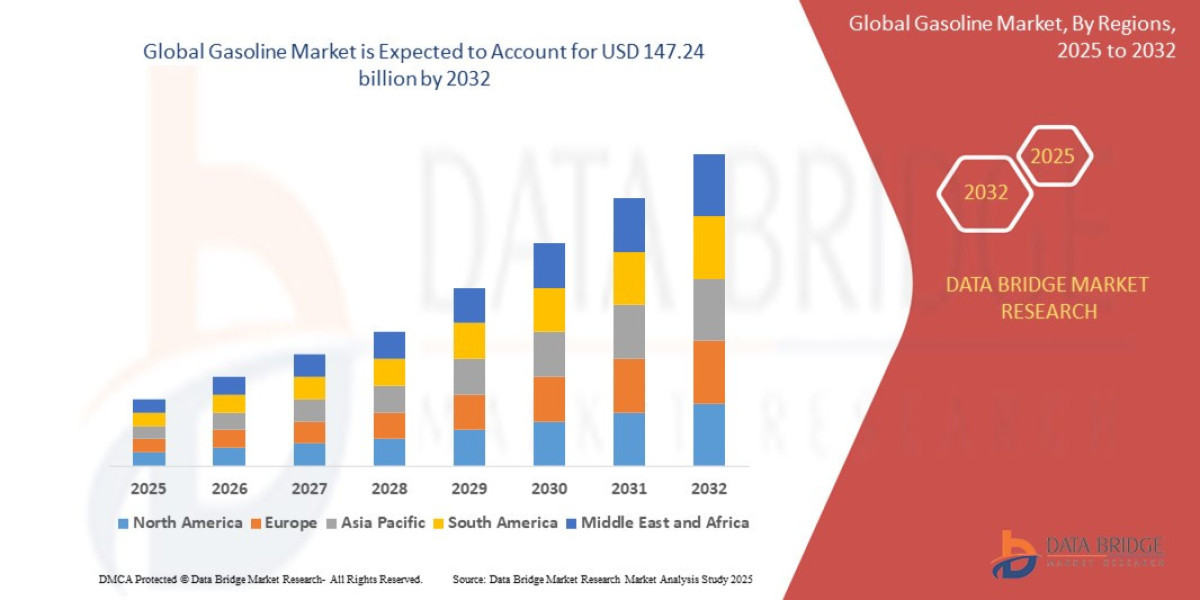Gasoline Market Overview
The Gasoline Market plays a fundamental role in the global energy landscape, serving as a primary fuel for transportation and industrial applications. Gasoline, derived from crude oil through the refining process, powers the majority of vehicles worldwide, making it one of the most vital petroleum products. Despite the growing emphasis on renewable energy and electric mobility, gasoline remains a critical energy source, particularly in developing economies with expanding automotive sectors.
The Gasoline Market was valued at USD 132.67 billion in 2024 and is projected to reach USD 147.24 billion by 2032, growing at a CAGR of 1.50% during the forecast period. The market’s steady growth is driven by increasing global transportation needs, economic expansion, and rising demand from emerging economies in Asia, Africa, and Latin America.
Competitive Landscape
The Gasoline Market is highly competitive and dominated by global oil and gas majors. Companies are focusing on refinery modernization, cleaner fuel formulations, and strategic alliances to expand their market reach. Leading companies in the market are Saudi Arabian Oil Co. (Saudi Arabia), Exxon Mobil Corporation (U.S.), BP p.l.c (U.K.), Shell plc (U.K.), PDVSA - Petróleos de Venezuela, S.A. (Venezuela), Gazprom Energoholding LLC (Russia), Chevron Corporation (U.S.), Kuwait Petroleum Corporation (Kuwait), Petrobras (Brazil), LUKOIL (Russia), ROSNEFT (Russia), ADNOC (U.A.E.), China Petrochemical Corporation (China), Petroliam Nasional Berhad (PETRONAS) (Malaysia), Eni (Italy), ENOC Company (U.A.E.)
Request Sample For Gasoline Market @ https://www.databridgemarketresearch.com/request-a-sample?dbmr=global-gasoline-market
Gasoline Market Drivers
- Growing Demand for Transportation Fuel
The transportation sector continues to be the largest consumer of gasoline, accounting for the majority of its global usage. Rising urbanization, expanding road infrastructure, and an increasing number of passenger vehicles are propelling gasoline consumption. Developing countries with growing middle-class populations are witnessing higher demand for private vehicles, which further fuels gasoline sales.
- Technological Advancements in Refining and Fuel Efficiency
Advancements in refining technologies have improved gasoline production efficiency, enabling refiners to maximize output and meet varying regional quality standards. Meanwhile, automakers are developing vehicles with enhanced fuel efficiency, helping reduce overall fuel consumption without compromising performance. The development of bio-based and blended gasoline formulations is also gaining attention as part of the shift toward cleaner fuels.
Impact of Alternative Energy and Electric Vehicles (EVs)
While electric vehicle adoption is growing rapidly in developed markets, gasoline remains dominant in the global fuel mix due to the lack of charging infrastructure and affordability challenges in emerging nations. However, the gradual transition toward electric and hybrid vehicles may slow down long-term gasoline demand growth. Governments worldwide are promoting emission reduction policies, which could influence gasoline consumption patterns in the coming years.
Gasoline Market Segmentation
By Grade:
- Regular Gasoline
- Mid-Grade Gasoline
- Premium Gasoline
By Application:
- Transportation
- Industrial
- Power Generation
- Others
By End User:
- Automotive
- Marine
- Aviation (blended fuels)
- Industrial and Commercial Sectors
Regional Insights
Asia-Pacific dominates the petroleum fuel market, accounting for the largest share due to the region’s booming automotive sector, rapid urbanization, and rising disposable incomes. China, India, Japan, and South Korea are key contributors, with growing vehicle ownership rates driving strong fuel demand.
North America holds a significant share, supported by large vehicle fleets, advanced refining capacity, and a well-developed distribution network. The United States remains a major gasoline consumer, with a steady demand from passenger and commercial transportation sectors.
Europe is gradually shifting toward cleaner fuels and electric mobility, but gasoline continues to play a role, especially in Central and Eastern Europe. Stricter emission standards and rising EV adoption, however, are expected to moderate future gasoline consumption in the region.
Latin America and the Middle East & Africa are witnessing increased fuel demand, driven by industrialization, urban growth, and expanding transportation networks. The Middle East also plays a crucial role as a major exporter of refined petroleum products.
Key Market Trends
- Adoption of Biofuel Blends: Growing use of ethanol and bio-based gasoline blends to reduce carbon emissions and improve octane ratings.
- Refining Capacity Expansion: New refinery projects and modernization efforts in Asia and the Middle East to meet rising fuel demand.
- Regulatory Push for Cleaner Fuels: Governments enforcing lower sulfur content standards to minimize pollution.
- Digital Transformation in Refineries: Integration of IoT, automation, and AI in refining operations for better efficiency and reduced downtime.
- Emergence of Hydrogen and Synthetic Fuels: Exploration of low-emission fuel alternatives as part of the global energy transition.
Emerging Opportunities for Gasoline Market
Bio-Gasoline Development
Advancements in biofuel technology are creating opportunities for bio-based gasoline production from renewable feedstocks, reducing dependency on fossil fuels and improving environmental sustainability.
Hybrid Vehicle Integration
The growing popularity of hybrid vehicles, which use gasoline alongside electric power, will sustain gasoline demand while promoting energy efficiency.
Expanding Refining Infrastructure in Developing Economies
Developing nations are investing in new refineries and upgrading existing facilities to meet domestic fuel requirements and reduce import dependence.
Clean Fuel Initiatives
Ongoing R&D efforts in producing low-sulfur and carbon-neutral fuels will open new avenues for innovation in the gasoline sector.
Gasoline Market Future Outlook
The Gasoline Market Outlook will continue to play a vital role in the global energy ecosystem, particularly in transportation and industrial sectors. While the shift toward electric mobility and renewable energy is reshaping the market landscape, gasoline’s widespread availability, high energy density, and affordability will sustain its importance in the near term.
In the long run, the market is expected to evolve toward cleaner, bio-based, and hybrid fuel solutions, aligning with global sustainability goals. Technological advancements, government policies, and investments in refining and alternative energy will determine the pace of this transformation.
About Us:
Data Bridge is one of the leading market research and consulting agencies that dominates the market research industry globally. Our company’s aim is to give clients the knowledge they require in order to function in changing circumstances. In order to give you current, accurate market data, consumer insights, and opinions so that you can make decisions with confidence, we employ a variety of techniques, including surveys, video talks, and focus groups around the world.
Contact :
Data Bridge Market Research Private Ltd .
3665 Kingsway — Suite 300 Vancouver BC V5R 5W2 Canada
+1 614 591 3140 (US)
+44 845 154 9652 (UK)







